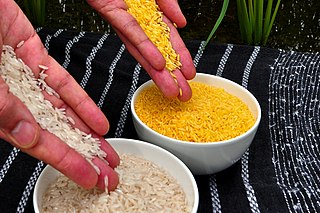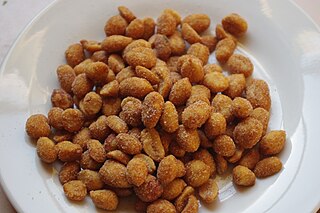Related Research Articles

The pistachio, a member of the cashew family, is a small tree originating from Central Asia and the Middle East. The tree produces seeds that are widely consumed as food.

The peanut, also known as the groundnut, goober (US), pindar (US) or monkey nut (UK), and taxonomically classified as Arachis hypogaea, is a legume crop grown mainly for its edible seeds. It is widely grown in the tropics and subtropics, being important to both small and large commercial producers. It is classified as both a grain legume and, due to its high oil content, an oil crop. World annual production of shelled peanuts was 44 million tonnes in 2016, led by China with 38% of the world total. Atypically among legume crop plants, peanut pods develop underground (geocarpy) rather than above ground. With this characteristic in mind, the botanist Carl Linnaeus gave peanuts the specific epithet hypogaea, which means "under the earth".

Golden rice is a variety of rice produced through genetic engineering to biosynthesize beta-carotene, a precursor of vitamin A, in the edible parts of rice. It is intended to produce a fortified food to be grown and consumed in areas with a shortage of dietary vitamin A, a deficiency which each year is estimated to kill 670,000 children under the age of 5 and cause an additional 500,000 cases of irreversible childhood blindness. Rice is a staple food crop for over half of the world's population, providing 30–72% of the energy intake for people in Asian countries, and becoming an effective crop for targeting vitamin deficiencies.

Peanut butter is a food paste or spread made from ground, dry-roasted peanuts. It commonly contains additional ingredients that modify the taste or texture, such as salt, sweeteners, or emulsifiers. Peanut butter is consumed in many countries. The United States is a leading exporter of peanut butter and one of the largest consumers of peanut butter annually per capita.

The Brazil nut is a South American tree in the family Lecythidaceae, and it is also the name of the tree's commercially harvested edible seeds. It is one of the largest and longest-lived trees in the Amazon rainforest. The fruit and its nutshell – containing the edible Brazil nut – are relatively large, possibly weighing as much as 2 kg in total weight. As food, Brazil nuts are notable for diverse content of micronutrients, especially a high amount of selenium. The wood of the Brazil nut tree is prized for its quality in carpentry, flooring, and heavy construction.
Famine relief is an organized effort to reduce starvation in a region in which there is famine. A famine is a phenomenon in which a large proportion of the population of a region or country are so undernourished that death by starvation becomes increasingly common. In spite of the much greater technological and economic resources of the modern world, famine still strikes many parts of the world, mostly in the developing nations.

Powdered milk, also called dried milk, or milk powder, is a manufactured dairy product made by evaporating milk to dryness. One purpose of drying milk is to preserve it; milk powder has a far longer shelf life than liquid milk and does not need to be refrigerated, due to its low moisture content. Another purpose is to reduce its bulk for the economy of transportation. Powdered milk and dairy products include such items as dry whole milk, nonfat (skimmed) dry milk, dry buttermilk, dry whey products and dry dairy blends. Many exported dairy products conform to standards laid out in Codex Alimentarius. Many forms of milk powder are traded on exchanges.

Peanut oil, also known as groundnut oil or arachis oil, is a vegetable oil derived from peanuts. The oil usually has a mild or neutral flavor but, if made with roasted peanuts, has a stronger peanut flavor and aroma. It is often used in American, Chinese, Indian, African and Southeast Asian cuisine, both for general cooking, and in the case of roasted oil, for added flavor.
Therapeutic foods are foods designed for specific, usually nutritional, therapeutic purposes as a form of dietary supplement. The primary examples of therapeutic foods are used for emergency feeding of malnourished children or to supplement the diets of persons with special nutrition requirements, such as the elderly. For liquid nutrition products fed via tube feeding see Medical foods.

Plumpy'Nut is a peanut-based paste in a plastic wrapper for treatment of severe acute malnutrition manufactured by Nutriset, a French company. Removing the need for hospitalization, the 92-gram packets of this paste can be administered at home and allow larger numbers to be treated.
André Briend is a French pediatric nutritionist best known for his 1996 co-formulation of Plumpy'nut, a Ready-to-Use Therapeutic Food (RUTF), with Dr. Mark Manary. Starting in 1994, Briend, who at the time worked at Institut de recherche pour le développement, worked with Michel Lescanne to develop variants of renutrition products in solid form. At the time, the WHO-recommended diet for the treatment of severe malnutrition required clean water, a commodity only available in hospitals in most developing countries. These trial products were ultimately discarded for not meeting the requirements of good shelf-life, pleasant taste, or logistic simplicity. In 1996, inspired by a jar of chocolate spread which had a similar composition of proteins, energy, and lipids as the diet recommended by the WHO, Briend came up with the idea of replacing part of the dry skim milk in the existing recipe with peanut butter and eventually created Plumpy'nut. Briend also served as a medical officer for the Department of Child & Adolescent Health and Development at the World Health Organization.

Meds & Food for Kids is a nonprofit organization dedicated to treating and preventing child malnutrition in Haiti by producing fortified peanut-based foods. Meds & Food for Kids uses a peanut-based feeding approach called Ready-to-Use Therapeutic Food (RUTF), known as Medika Mamba.

In culinary nomenclature, nuts are dry, edible fruits or seeds that usually, but not always, have a high fat content.

BP-5 Compact Food is a high-calorie, vitamin fortified, compact, compressed and dry food, often used by relief agencies for the emergency feeding of refugees and internally displaced persons.
Nutriset is the French manufacturer and trademark owner of Plumpy'nut, the peanut-based food for use in famine relief. It was formulated in 1997 by André Briend, a French pediatric nutritionist. The majority of Plumpy'nut is produced in a Nutriset factory in Malaunay, and Unicef purchases 90 percent of the supply from that factory for humanitarian aid.

Post Holdings is an American consumer packaged goods holding company headquartered in the suburban St. Louis community of Brentwood, Missouri. It operates in the center-of-the-store, foodservice, food ingredient, refrigerated, active nutrition and private label categories. Its Post Consumer Brands business manufactures, markets and sells both branded and private label cereal products. Its Michael Foods Group business supplies value-added egg products and refrigerated potato products to the foodservice and food ingredient channels. Through its Post Refrigerated Retail business, Post offers potato, egg, sausage and cheese refrigerated side dishes products. Its active nutrition business markets and distributes protein beverages, bars and gels. Post participates in the private brand food category through its investment with Thomas H. Lee Partners in 8th Avenue Food & Provisions, a leading, private brand centric, consumer products holding company.
Citadel Spread is a paste made of peanut butter, oil, sugar and milk powder. First developed as a trail food for hikers, a Citadel Spread resembles common ready-to-use therapeutic food (RUTF) formulations, such as Plumpy'nut.

Honey-roasted peanuts is a salt-, sugar- and honey-flavored peanut snack food that is provided as a mass-produced product line by several nut and snack food companies, such as Planters, The Sun Valley Nut Co, and King Nut.
Patents for Humanity is an awards program run by the United States Patent and Trademark Office.
References
- ↑ Rice, Andrew (2 September 2010). "The Peanut Solution". The New York Times . Retrieved 28 July 2012.
- ↑ "Nutriset's timeline". Nutriset. Retrieved 28 July 2012.